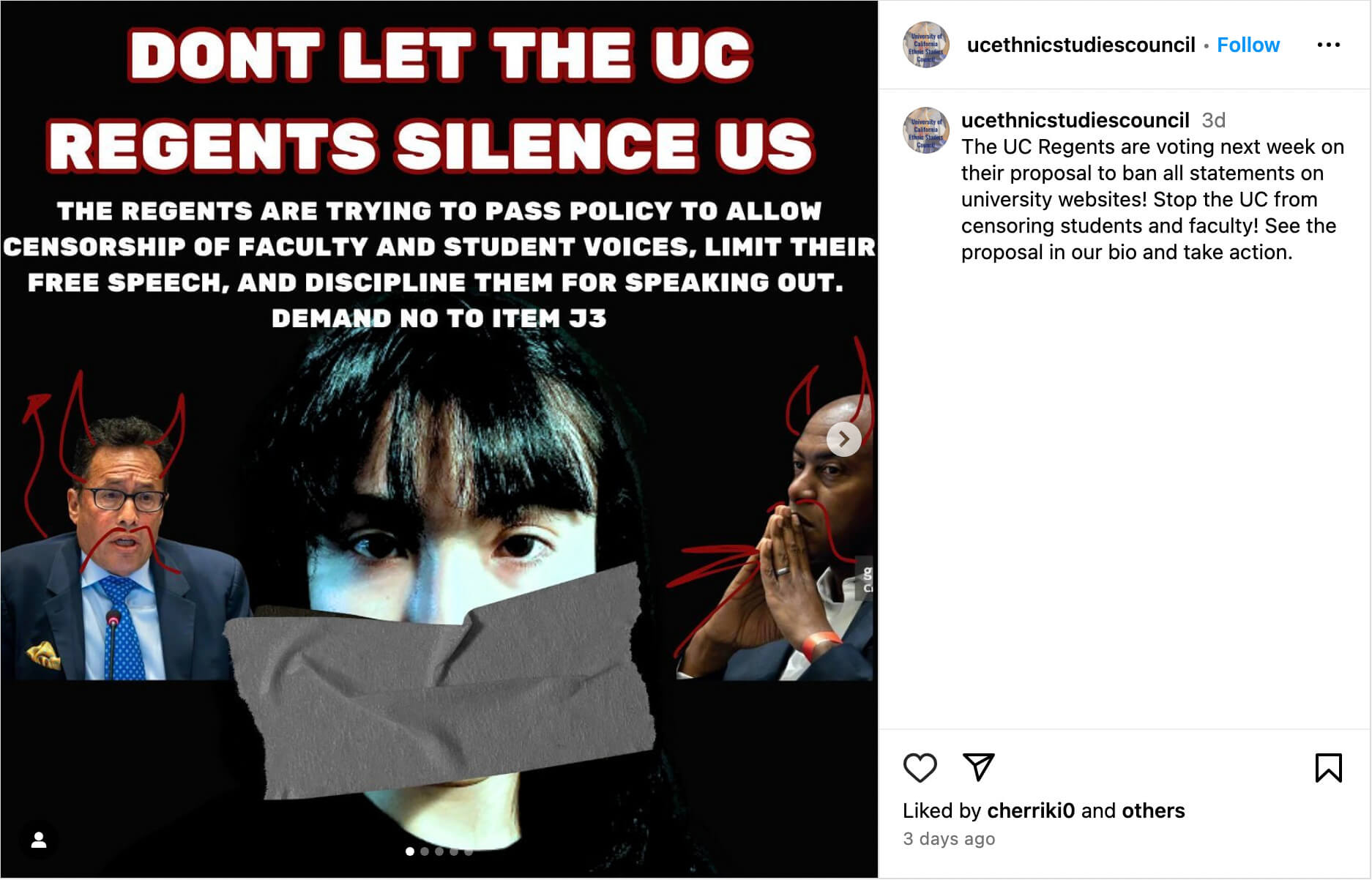California regents to vote on measure prompted by anti-Zionism on university websites
Hundreds of professors called on the University of California Board of Regents to stem ‘indoctrination’ in ethnic studies programs

An Instagram post by the UC Ethnic Studies Faculty Council calls on supporters to publicly oppose a proposal by the University of California Board of Regents that would limit the use of public university channels for political expression.
The governing board of the University of California system will vote Wednesday on a controversial measure to curtail political expression on websites and other official channels of university communication — a change proponents say is necessary to combat spiking antisemitism and anti-Zionism on campuses.
Advocates for the measure point out ethnic studies programs — a familiar target in the culture wars — as hotbeds of anti-Zionist activity that take particular advantage of department websites to spread a point of view hostile to supporters of Israel and many Jews. Though the proposal does not mention these departments, it would prohibit messaging for “purposes of publicly expressing the personal or collective opinions of unit members or of the entity.”
Two members of the Board of Regents, which makes policy for the system’s 10 campuses and nearly 300,000 students, said the measure was prompted by the actions of various ethnic studies programs within the UC system. Both spoke on condition of anonymity because, they said, they were not authorized to discuss the matter publicly.
A roiling debate
Many professors and students of ethnic studies, which focuses on the experiences of people of color within and beyond the U.S., are rallying against the vote, calling it an attack on freedom of speech.
An Instagram page for the UC Ethnic Studies Faculty Council uploaded a photo of two Regents with horns and a devil’s tail drawn on them, with the accompanying text, “Don’t let the UC Regents silence us.” The council has also called on Jay Sures, the Regents vice chairman, to resign, after he blasted a letter from the council that argued that the university should not have described Hamas’ Oct. 7 attack as “terrorism.”
On the other side of the debate, more than 400 UC faculty members released a letter Tuesday blaming ethnic studies programs for fueling antisemitism on campus — and university provosts for allowing the departments’ “indoctrination” to go unchecked.
“Neither the academic senate nor campus administrators have been willing to exercise their due diligence in addressing a problem that threatens to do great harm not just to Jews, but to the entire University,” the letter, obtained by the Forward, reads.
The contentiousness around the vote — which will be live-streamed following a public comment — is the latest struggle for ethnic studies, a discipline that has frequently been charged with antisemitism. And it marks one of the latest controversies around antisemitism in the UC system, which has been plagued by the accusations since Oct. 8, when an assistant professor at UC Davis posted on X — formerly known as Twitter — wrote about “Zionist journalists” and how they “have houses with address, kids in school” and “they should fear us more.”
California has also wrestled with teaching about Jews to younger students. A proposed state curriculum for K-12 students drew criticism in 2019 for lacking meaningful discussion of antisemitism and omitting Jewish contributions to American culture while including such contributions from other minority groups. (It was eventually revised.)
Beyond the vote
Signatories to the letter supporting the measure coming before the Regents said departments’ anti-Zionist activism within the UC system has included calls to join Israel boycotts, the promotion of Students for Justice in Palestine rallies, and “counterfactual anti-Zionist propaganda” in teacher training programs. It listed ethnic studies programs at UC Merced, UC Santa Cruz and UC San Diego as offending parties.
The UC Santa Cruz Critical Race and Ethnic Studies department, for example, has on its homepage a call from “We, the CRES faculty,” to “act now to end Israel’s genocidal attack on Gaza.”
Ethnic studies department chairs at each of those three schools did not respond to requests for comment Tuesday.
Ilan Benjamin, a chemistry professor at UC Santa Cruz who helped organize the letter, said he had asked the school’s provost, Lori Kletzer, to intervene after the Critical Race and Ethnic Studies Department posted several falsehoods about Israel’s response to the Oct. 7 attack on its website, including the claim that more than 700 Palestinians died when Israel bombed Al-Ahli Hospital. (Human Rights Watch questions the Hamas-run Gaza Health Ministry’s claim of 372 dead, and most intelligence agencies have concluded that the explosion was the result of a misfired Palestinian rocket.)
Benjamin said Kletzer’s response was, “‘Well, we can’t do that because of academic freedom.’” She did not respond to a request for comment.
The day after the 26-member board votes on the policy, it is scheduled to discuss the case of UC Davis’s Jemma Decristo, the assistant professor who has been on paid administrative leave since her alleged post on X about “Zionist journalists.”
A Change.org petition for Decristo’s firing has more than 7,000 signatures.
A message from our CEO & publisher Rachel Fishman Feddersen
I hope you appreciated this article. Before you go, I’d like to ask you to please support the Forward’s award-winning, nonprofit journalism during this critical time.
We’ve set a goal to raise $260,000 by December 31. That’s an ambitious goal, but one that will give us the resources we need to invest in the high quality news, opinion, analysis and cultural coverage that isn’t available anywhere else.
If you feel inspired to make an impact, now is the time to give something back. Join us as a member at your most generous level.
— Rachel Fishman Feddersen, Publisher and CEO